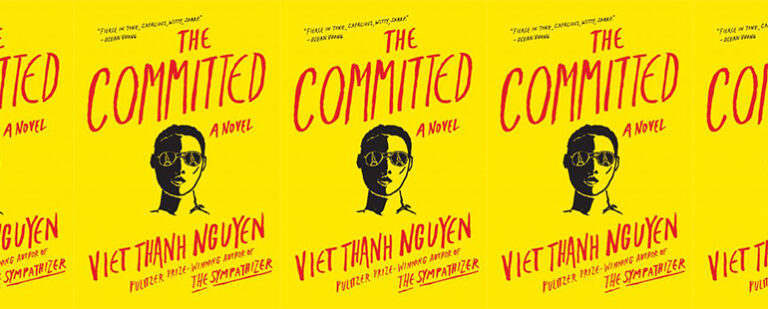New Waves by Kevin Nguyen

New Waves
Kevin Nguyen
One World | March 10, 2020
Kevin Nguyen’s debut novel, New Waves, explores grief not through the prisms of ruminating and loss, but rather through their absence. The book follows Lucas, a Vietnamese customer service rep with alcoholism, who helps Margo, his best friend, drinking buddy, and crush, steal user info from the tech company where she’s the sole Black employee. A few months later, Margo is killed in a hit-and-run. While Lucas finds it semi-suspicious that someone as alert and cunning as Margo would die in such a way, he leaves any possible mystery surrounding her death to sit in the dust. Instead, Lucas spends the rest of the book struggling to decide how to honor Margo’s memory, destroying his relationship with his girlfriend, Jill, and passively letting the kind of casual racism Margo hated wash over him. Nguyen shepherds the growth of his sloppy protagonist, and the private, lonely life he leads as someone in mourning, with depth, understanding, and self-awareness.
Nguyen’s work as a longtime editor—he currently works as the features editor of The Verge, after serving as the digital deputy editor of GQ and editorial director at Google Play Books, among other roles—shines through in his writing, with storytelling kept close to the ground, an eye for detail that enhances and doesn’t overcrowd, and plotting that turns subtly enough to keep the prose moving. Early on, Nguyen neatly establishes a deep bond between Lucas and Margo by paralleling their emerging friendship as adults with their initial kinship as teenagers, swapping records on a rare music message board called PORK. Here, Nguyen shades the characters with introverted tendencies and a penchant for loneliness—the two swap music obsessively, but never learn about each other beyond their shared interest in records. From there, Nguyen mirrors Lucas’s misguided belief that Margo is perfect with her teenaged belief that by archiving Free Lossless Audio Codec (FLAC) music files, the PORK community is helping to create a digital archive of perfect sound.
This belief in Margo’s perfection doesn’t change for Lucas, who is still passive and lonely even as a young adult, but Margo’s obsession with perfect sound morphs into a fastidious love of creating sci-fi stories that suggest the world can do better in terms of race, sex, and gender scripts. Recorded as WAV files, the stories are created by a solitary (and drunk) Margo, each blending a potent cocktail of Robert Heinlein’s world-building, Richard Matheson’s humanity, and Octavia Butler’s exploration of race, class systems, and evolution. These stories, seemingly made just for Margo herself, are intimate and personal:
A second miracle: after six days, the ship eventually beaches safely. The man insists on getting out first. He looks around. The island is tropical. Beyond the beach is a deep, intimidating jungle.
The man takes charge. First, they need to secure food and shelter if they’re going to build their life together. Second, they―
Life together? This is news to the woman.
It is their duty, he says, to have a family, to continue the existence of the human race. They have a responsibility. Father and mother to a new generation.
The woman laughs. Duty? Responsibility? This is what people believed on the old planet. This, here, is a new planet. This is an opportunity, not a do-over.
In these stories, Margo is claiming and remaking the myths women and people of color have been told about who they are and how they’re supposed to be. She’s doing what the best sci-fi does: remaking the world into a place it’s capable of being, rather than depicting it as it is.
In time, the mystery of Margo’s private life only continues to grow. To Lucas, Margo was just his lonely, outspoken, beautiful best friend who was always smarter than everyone in the room, but he finds that, in addition to the recordings, she had someone she was sleeping with, as well as a private online life as an editor for a novelist named Jill (whom Lucas later begins seeing). Such differences between the private and social lives of characters make up the fabric of New Waves, and the mystery between these two lives moves the plot onward. After Margo dies, Jill and Lucas’s relationship forms from their shared fascination with Margo’s hidden private life. While this shared interest brings Lucas and Jill together, Nguyen shows how in the end, it is Lucas’ love for his deceased friend that pulls them apart.
The relationship reaches its breaking point when Lucas is racially harassed on the train in front of Jill. When Margo was alive, she always more outspoken than Lucas, vocally objecting to racism while Lucas remained silent, taking comments that he’s “a natural” at ping-pong in stride and patiently sitting while his white boss gloats about his ability to identify different groups within the Asian identity correctly. After Margo’s death, when Lucas is belligerently called “chink” and “yellow-dicked” by a white day laborer on the train, he is furious when Jill stands up for him. Afterward, she and Lucas have a fight over her decision to do so, and whether she only behaved this way because she knew him and would not have said anything if he was a stranger. Later, at Jill’s apartment, he continues to be angry and lobs blame for how racist the world is at her, and then walks out, breaking them up. In the end, Lucas wanted someone to stand up for him, but he wanted that someone to be Margo.
While dissecting racial transgressions and identity, Nguyen lets his characters grow in their self-awareness when it comes to overstepping or overlooking bias, consistently reinforcing the idea that it takes effort to recognize one’s innate prejudices, and that not everyone is equally aware. After Jill and Lucas’s breakup, Jill becomes more thoughtful about the distinction between caring about racial bias when it’s personal, and overlooking it when it’s not. She calls out her next lover, Michael, for creating photo identification tech that couldn’t identify people of color. She stops seeing a friend who casually uses the terms “yellow fever” and “jungle fever” when discussing dating outside of one’s racial group. As Jill becomes more aware of her privilege and bias, Lucas grows as well. He stops trying to preserve his image of Margo as a goddess who once lamented, “Everybody wants to fuck a black girl, but nobody wants to fuck a black girl,” and decides to bury her in Japan, a country she admired for the blending of genres in “city pop” music. Lucas buries an iPod full of her stories in a cemetery, replete with LED Buddhas, and begins to let her go.
Nguyen’s ambitious debut is a mash-up of reflection, growth, and rumination on death. In a world that seems increasingly chaotic and divided, Nguyen offers a refuge with his humble, distinct take on race relations in America, and smart analysis of the ways technology shape our personal and public lives.


